Designing with Care: Alex Reed’s Journey to Leading Hospitable Thinking at AvroKO’s London Studio
As the Design Director at AvroKO’s London studio, Alex Reed brings over a decade of experience in crafting hospitality spaces that prioritize the care and comfort of guests. With a portfolio that includes the refurbishment of the iconic Groucho Club and the creation of award-winning restaurant spaces, Alex has honed her ability to deliver cohesive designs that focus on making guests feel valued and secure.
In this conversation, Alex discusses the importance of human-centric design, the collaborative ethos at AvroKO, and how her experience with legacy brands like Hilton and Marriott has shaped her approach to caring for guests through thoughtful and innovative Hospitable Thinking®.

Alex Reed, Design Director, AvroKO’s London studio,
Alex, could you start by telling me about your journey in design and your route to becoming Design Director at AvroKO’s London Studio?
My journey in design has been a diverse and enriching one. I am a qualified architect, and during my studies I had a unique experience working as a waitress for an international events company. It was during this time that I truly immersed myself in the world of hospitality and discovered the transformative power of design in creating memorable spaces. The fast-paced environment allowed me to witness how spaces could be quickly and creatively transformed, sparking my passion for innovative design solutions.
After spending a decade working for a design firm in both London and New York, honing my skills and gaining valuable experience, I was fortunate to join AvroKO. I could then channel my architectural background and hospitality insights into creating exceptional design experiences.
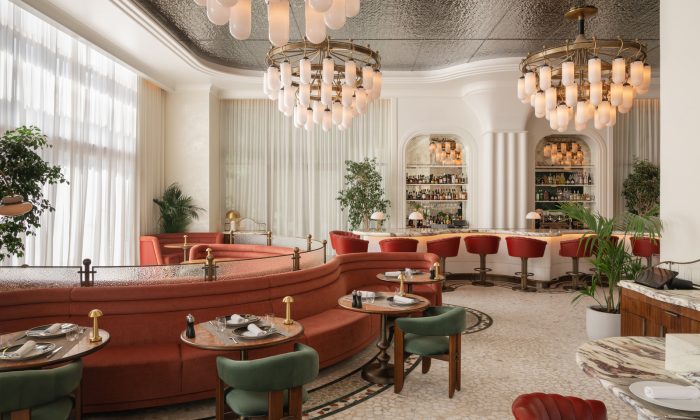
Robuchon Mediterranean restaurant, La Méditerranée, The Pearl-Qatar
AvroKO is known for its industry leading design ethos, rooted in the values of creating as a collective and thinking sideways. Can you elaborate on this foundational design approach, what they mean for your clients, and the impact on the guests’ experience?
We embrace a collective approach to design, promoting inclusivity and democratic processes where every individual, from interns to partners, has a valued voice in our creations. We prioritise equity and collaboration, sharing both challenges and successes. Our unique design philosophy encourages thinking sideways by celebrating the unconventional and seeking innovative solutions that offer unparalleled experiences to our clients and their guests. We aim to revolutionise the industry by consistently delivering fresh and unexpected creations that redefine hospitality spaces.
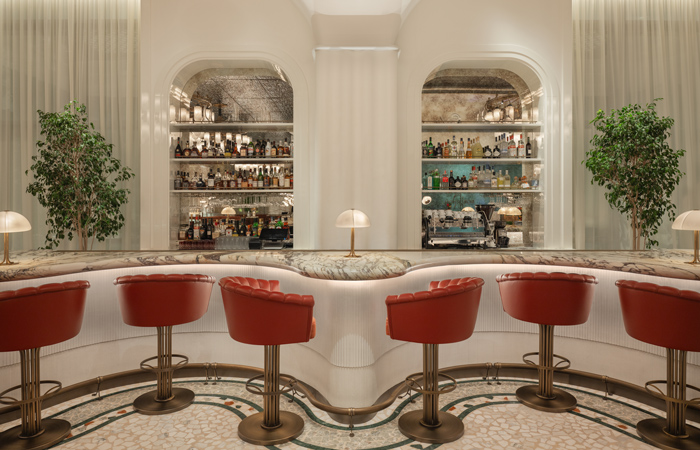
Robuchon Mediterranean restaurant, La Méditerranée, The Pearl-Qatar
Care is at the heart of Hospitable Thinking®, a concept central to AvroKO’s work. Can you explain what this concept entails?
Our approach of Hospitable Thinking® blends insights from behavioral sciences and environmental psychology to enhance the overall guest experience. It revolves around three foundational pillars:
Significance, Security, and Surprise. These principles are seamlessly woven into the fabric of the design, catering to both the grand gestures and the subtle nuances. Significance goes beyond meeting guests’ basic needs; it aims to make them feel truly valued and exceptional. Security addresses the innate human desire for safety, providing a sense of grounding and comfort that promotes happiness and well-being through the release of endorphins, reducing stress and enhancing overall satisfaction. Surprise elements in design and hospitality trigger dopamine release, enhancing pleasure and satisfaction by introducing unpredictability and novelty into experiences.
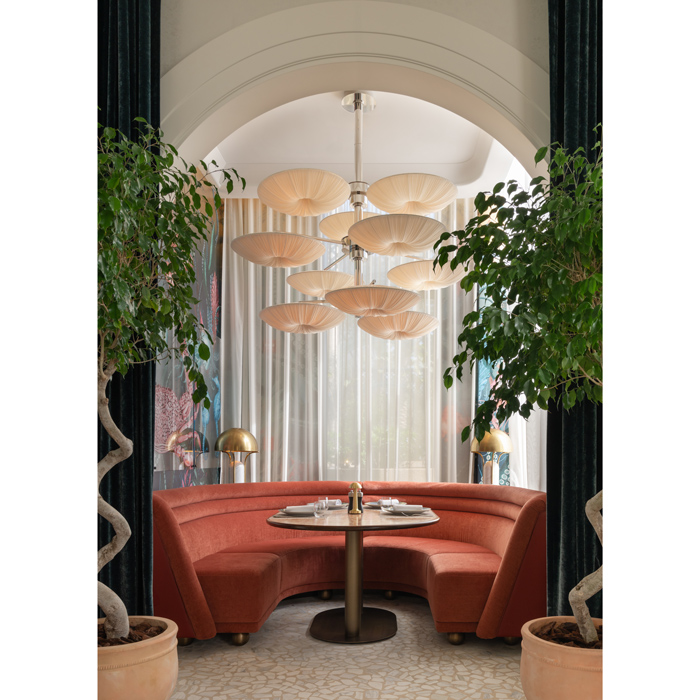
Robuchon Mediterranean restaurant, La Méditerranée, The Pearl-Qatar
How does the principle of Hospitable Thinking® manifest in your projects? Could you share some insights into the process of integrating this philosophy into your designs?
The principle of Hospitable Thinking®️ permeates every aspect of our projects, shaping the design process from inception to completion. We prioritise understanding the needs and desires of guests at a deep level, infusing spaces with warmth, comfort, and thoughtful touches that elevate the overall experience.
Integrating this philosophy involves conducting in-depth research, collaborating closely with our clients and operators to align visions and implementing innovative solutions that prioritise human connection.
Each design decision is meticulously considered to ensure that hospitality remains at the core of our creations.
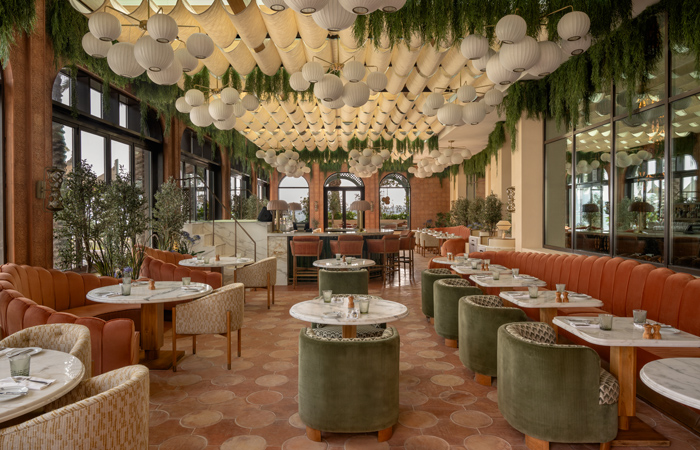
Chicago Rare Steakhouse, Four Seasons Resort and Residences at The Pearl-Qatar
Could you provide three specific examples from recent projects where Hospitable Thinking® has been applied to enhance guest care and create memorable experiences?
At the Revery Bar, Hilton Park Lane, here in London we incorporated unexpected elements to create a space that brings delight and surprise, examples include a DJ booth inbuilt to the bar and secret Champagne ice wells!
At Chicago Rare Steakhouse at the Four Seasons Resort and Residences at The Pearl-Qatar, we focused on creating a highly comfortable and rich space, luxuriously large booths for group dining and soft glowing lighting in the evenings. Additionally, we added personalised whisky storage, each with their own key.
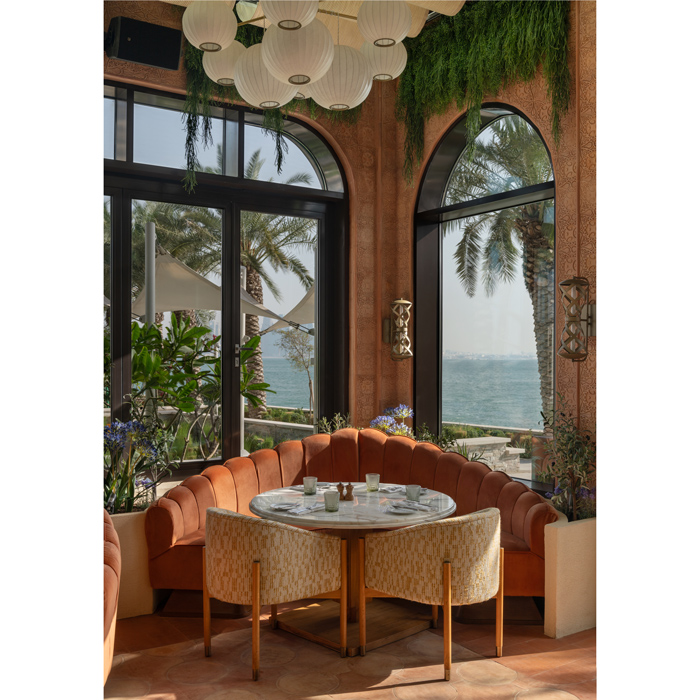
Chicago Rare Steakhouse, Four Seasons Resort and Residences at The Pearl-Qatar
In the Robuchon Mediterranean restaurant project, La Méditerranée, also at The Pearl-Qatar, we collaborated closely with the chefs to craft an unparalleled dining experience at the chef’s counter, ensuring guests were not only treated to exquisite cuisine but also an interactive and memorable encounter, setting this dining experience apart from traditional restaurant visits.
Delivering Hospitable Thinking® requires specific expertise and a deep understanding of human needs. What key skills and knowledge are essential within your team, and how do you ensure this expertise is maintained and effectively communicated?
We encourage team visits to successful hospitality spaces to immerse ourselves in experiences firsthand, fostering a deep understanding of guest needs. By engaging directly with staff and observing operational hotels, we gather essential feedback that informs our design approach, especially when working on new branded hotels or restaurants. We create as a collective—collaboration within our team is key as we plan spaces, discussing and incorporating the principles of Significance, Security, and Surprise from the initial
planning stages to the final creation of detailed CGIs. Working on the full cycle of projects allows us to witness our designs in action, ensuring our vision is realised as intended.
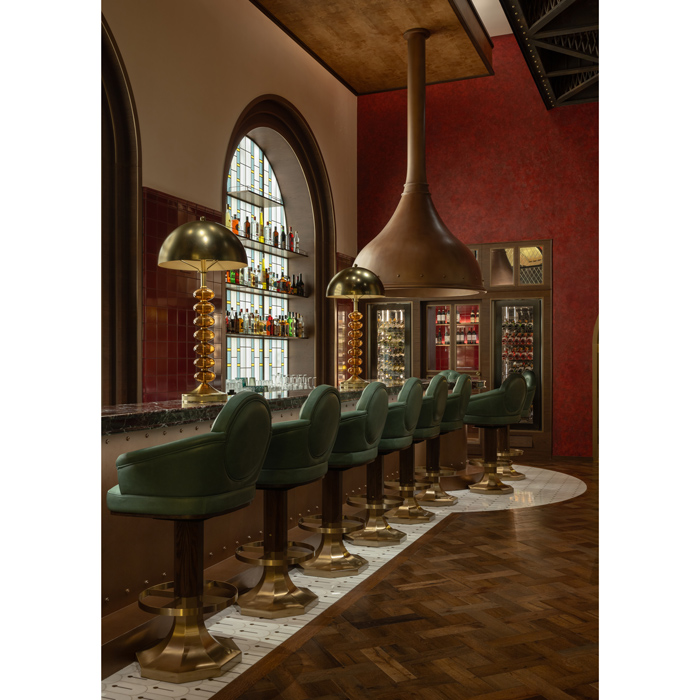
Chicago Rare Steakhouse, Four Seasons Resort and Residences at The Pearl-Qatar
Does Hospitable Thinking® extend beyond guest-facing areas to influence the design of the heart-of-house spaces? If so, how do you ensure that the same level of care is maintained throughout the entire project?
Acknowledging the crucial link between happy staff and guest satisfaction in the hospitality industry is hugely important. By prioritising staff well-being and comfort in the design process, we create environments that minimise maintenance needs, optimise workflow efficiencies, and promote a positive working atmosphere. The blurring of boundaries between front of house and heart of house spaces reflects a modern approach in hospitality design. Considerations such as walking distances and fluid spatial layouts such as open kitchens are carefully discussed during the design phase to enhance operational functionality and promote seamless collaboration. Ultimately, by nurturing a culture of care and respect for both guests and employees, we aim to cultivate dynamic spaces that thrive on positive energy.
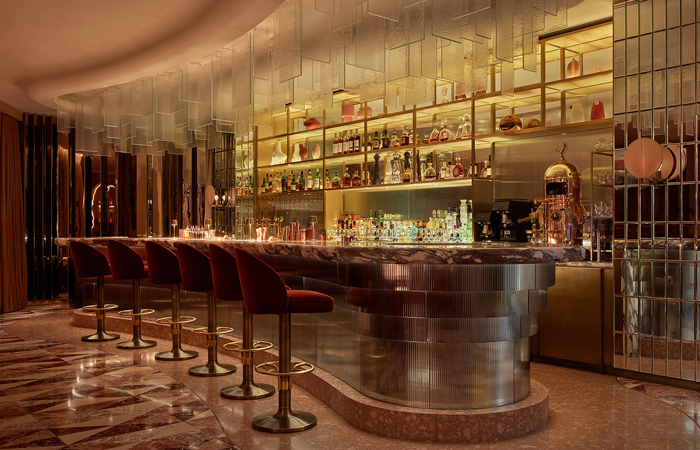
Revery Bar, Hilton Park Lane, London
In your view, how does a focus on caring and human-centric design help secure the future of hospitality settings? What evolutions do you foresee in the hospitality industry in the near future?
Focusing on caring and human-centric design in hospitality settings is pivotal for securing the industry’s future by providing guests with elevated experiences beyond the ordinary. Guests often appreciate and feel cared for without fully understanding why. This emphasises the importance of subconscious emotional connections.
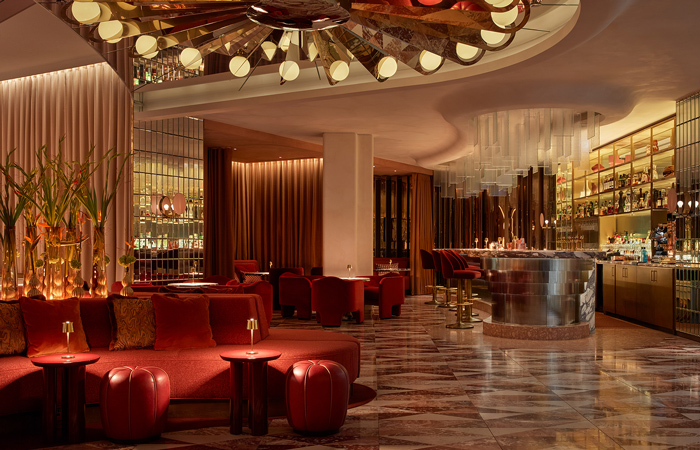
Revery Bar, Hilton Park Lane, London
In the future, I anticipate a move towards more sensory-focused design, considering elements like sound, touch, and smell to intensify guest comfort and well-being. Technological advancements such as temperature-controlled mattresses, state of the art wellness offerings and air quality monitoring are already available and I expect these to become more prevalent—they are certainly things we are looking into! Hospitality will continue to be a pioneering platform for showcasing innovative technologies, mirroring historical milestones like the introduction of electricity or passenger elevators into hotels.




